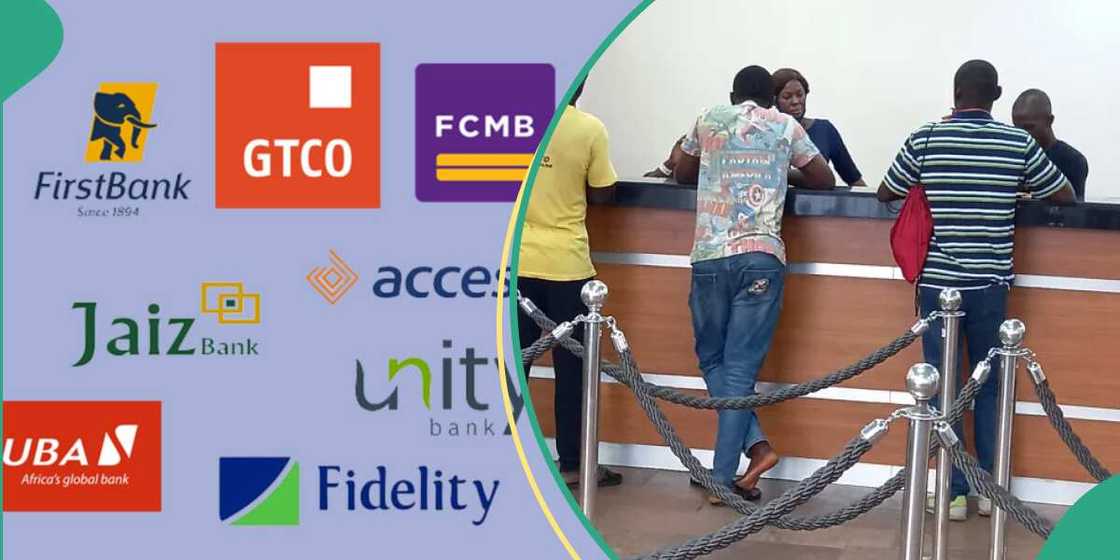Access, GTB, Zenith, Others’ Charges on Customers for Borrowing As CBN Stops CRR Debits
- The Central Bank of Nigeria has revealed the maximum lending rates for all Nigerian banks
- The document on the CBN website is part of the apex bank's commitment to transparency and full disclosure
- The CBN's decision to stop daily CRR debits on banks' accounts will mean enough cash availability for businesses to obtain loans
Analysis of Central Bank of Nigeria data revealed the lending rates obtainable in 31 Deposit Money Banks (DMBs).
Nigerian banks impose interest rates ranging from 4% to 45% on loans across agriculture, forestry, manufacturing, and education sectors.

Source: UGC
Apart from that, there are other administrative charges, which sometimes are not known to customers.
Lending rates of banks
According to a CBN document published on December 25, 2023, there are two types of rates: the maximum lending rates and the prime lending rates.

Read also
CBN imposes new capital requirement on currency traders in Nigeria, Limits FX cash purchases
The maximum lending rate is the highest amount banks charge for lending to riskier sectors.
In the same way, prime lending is the interest rate that deposit money banks charge their most creditworthy customers.
Breakdown of banks' lending rate
The lending rates cut across different sectors, but this report will primarily focus on the general business maximum lending rates.
According to the document, First City Monument Bank's 36% maximum lending rate for general business is the highest among the banks, while FBN merchant bank has the lowest rate of 12%.
For Prime lending rates, Coronation Bank also has the highest maximum lending rate of 31%, while FBN Quest Merchant has the lowest with 5%.
Here's a breakdown of banks' maximum lending rates
- FCMB (First City Monument Bank): 42%
- Stanbic IBTC: 37.5%
- Keystone Bank Ltd: 36%
- Heritage Bank: 35%
- Union Bank: 35%
- Sterling Bank: 33%
- Unity Bank: 33%
- United Bank for Africa: 32%
- Access Bank: 30%
- Ecobank: 30%
- Providus Bank: 30%
- Titan Trust Bank: 30%
- Zenith Bank: 30%
- First Bank of Nigeria: 28%
- Fidelity Bank: 26%
- FBN Quest Merchant: 24%
- Globus Bank Ltd: 24%
- Standard Chartered Bank: 25%
- Guaranty Trust Bank: 25%
- FSDH (FSDH Merchant Bank): 25%
- Wema Bank: 29.5%
- Premium Trust: 29%
- Citi Bank: 22.5%
- SunTrust: 20%
- Nova Merchant Bank: 20%
- Rand Merchant Bank Nig. Ltd: 13.99%
- Coronation Bank: 12%
CBN stops daily CRR debits
Legit.ng earlier reported that the CBN stopped the daily debit of the cash reserve ratio of Nigerian banks
This decision means that Access Bank, UBA, GTBank, and other commercial banks in Nigeria will retain more customers' deposits.
A higher percentage of CRR will reduce the banks' capacity to lend to borrowers, while a reduction in CRR will make more funds available to the banks to lend to customers.
CBN hopes its decision will boost companies' access to financing needed to support the development of the Nigerian economy.
PAY ATTENTION: Donate to Legit Charity on Patreon. Your support matters!
Source: Legit.ng


